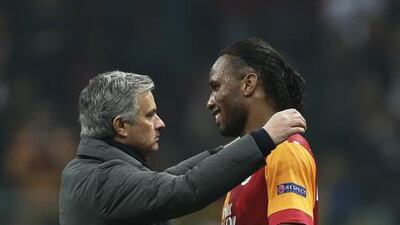Nostalgia is not what it used to be. Now past and present merge as an emotional reunion doubles up as a seismic sporting clash.
Even a club whose modern identity dates back only 11 years is finding historical greats still have a seductive allure.
Chelsea were at the vanguard of the nouveaux riche when Roman Abramovich bought and transformed them in 2003. Now they find old faces increasingly appealing. This season – with Jose Mourinho's second coming at Stamford Bridge – has been an extended exercise in revisiting their past.
Now, for the final time, their greatest manager will be joined by their greatest player. Didier Drogba’s return as the spearhead of the Galatasaray attack may only be the subplot of a night when Chelsea seek a place in the Uefa Champions League quarter-finals.
Drogba has a capacity to overshadow everyone else, especially in Chelsea’s Champions League games. They remember his explosive exits, sent off in the 2008 final and ranting furiously about the Norwegian referee Tom Henning Ovrebo after the 2009 semi-final against Barcelona.
They treasure the memories of the most wondrous day in their history, of Drogba’s 88th-minute headed equaliser and his deciding penalty in the shoot-out against Bayern Munich that made Chelsea European champions for the first time. “It is the club where I experienced everything,” Drogba told Uefa’s website.
His final kick of a ball as a Chelsea player ended their long quest to win the Champions League.
The draw prompted inevitable comparisons between Drogba and the current crop of Chelsea strikers, Fernando Torres, Samuel Eto’o and Demba Ba.
The man who scored 157 goals in 341 games for the club still appears their superior in sepia-tinted reflections. There are theories that, at 36, Chelsea could still benefit from his services.
There was even a strange, and swiftly denied, story that he was wanted at Stamford Bridge as a strikers’ coach. But, unlike Mourinho, Drogba should not go back. The ending was too perfect.
Instead, what is almost certainly his last game at Stamford Bridge comes in Galatasaray colours.
"It is a very special moment because I do not know what my reaction will be," Drogba said, a fearless forward sounding worried.
“I am quite apprehensive about it. I think I’m allowed to say that I will receive a warm welcome because I know Chelsea’s fans and our relationship is really special.”
So, too, his rapport with “the Special One”. Mourinho and Drogba had a rare bond. It is an altogether closer connection than that between the two managers.
Roberto Mancini was replaced by Mourinho at Inter Milan and the Portuguese delights in taking sly potshots at his various predecessors and successors.
It did not escape the ever-competitive Mourinho’s attention that Mancini never took Inter beyond the quarter-finals of the Champions League, whereas he won the competition.
While there is less pressure on Mourinho to conquer Europe in his second spell at Stamford Bridge, elimination to Mancini would be embarrassing for him and a coup for the Italian, long criticised for his poor Champions League record.
Chelsea could have put the tie to bed in Turkey after Torres put them ahead and Mancini gambled on an overly attacking team.
Instead, he took swift remedial action, Aurelian Chedjou levelled and while Chelsea are the favourites to progress, they have ample experience of Drogba’s capacity to shape Champions League ties in his own, inimitable way.
sports@thenational.ae
Follow us on Twitter at SprtNationalUAE


